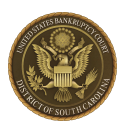In recognition of Pro Bono Week, the Judges of the United States Bankruptcy Court would like to thank the many members of the South Carolina Bar who selflessly volunteer to help the public in matters related to the work of our Court. A list of those volunteers is attached to this announcement.
Below are highlights of some of the bankruptcy-related pro bono programs offered in South Carolina:
Bankruptcy Court’s Ask-A-Lawyer Program: The Court, in partnership with the South Carolina Bar, sponsors a bankruptcy-related Ask-A-Lawyer program, which consists of two monthly opportunities for the public to call and speak with a volunteer attorney on bankruptcy and other debt collection issues. The calls are transferred to the voluntary attorney’s office directly from the Bankruptcy Court during a designated two-hour period. The attorney may remain anonymous in the discussions with the caller. Malpractice insurance is provided at no cost to the volunteer attorney by the South Carolina Bar for the legal guidance provided during the call.
Credit Abuse Resistance Education (C.A.R.E.) Program of South Carolina: C.A.R.E. is a financial literacy education program for students and young adults taught by volunteer attorneys at schools, conferences, churches and other community centers. Volunteer attorneys conduct a one-hour presentation on the use of credit and its related consequences as well as the advantages of budgeting and creating savings. Prior to giving a presentation, volunteer attorneys are provided interactive presentation materials and training.
Bankruptcy Court Bar Clinics (Charleston & Columbia): The Court also sponsors monthly free legal clinics where an individual may discuss bankruptcy or debt related issues with a volunteer attorney for up to one hour. The clinics are conducted at a time and date agreed upon by the volunteer attorney and the individual, and are now held by telephone or, if preferred by the volunteer attorney, at the attorney’s office or the Court. Many of the attendees of the legal clinics are individuals who are considering filing a bankruptcy case, who are creditors, or who seek other general bankruptcy information. Consultations from the legal clinics have led to representation agreements between the volunteer attorney and the individual.
Judge Waites’ Debtor Assistance Program: The Debtor Assistance Program applies only in Judge Waites cases and seeks to encourage representation by referring and matching pro se filers in the early stages of their case with consumer debtor's attorneys who have experience in chapter 13 cases. The referral process considers the attorney's geographic proximity to the debtor and the debtor's income level, but representation and its terms are subject to agreement between the debtor and the attorney. A separate referral program with South Carolina Legal Services is used for debtors with a qualifying low income.
South Carolina Legal Services Private Attorney Involvement (PAI) Program: South Carolina Legal Services Private Attorney Involvement (PAI) Program conducts a separate free monthly bankruptcy clinic for low income individuals who qualify under certain income guidelines.
South Carolina Bar’s Pro Bono Program: In addition to other services, the South Carolina Bar’s Pro Bono Program refers indigent debtors to attorneys for pro bono representation. Attorneys who accept pro bono cases through the program are offered malpractice insurance coverage for the case at no cost.
South Carolina Bar’s Free Legal Answers Program: In coordination with the American Bar Association, the S.C. Bar offers South Carolina Free Legal Answers, an online service in which qualified low income individuals may post legal questions, including those related to bankruptcy law, that are answered by volunteer attorneys. Volunteer attorneys are provided malpractice insurance at no cost for the legal guidance that they provide on the South Carolina Free Legal Answers website.
Volunteers are always needed and appreciated for these programs. If you are interested in volunteering for one of these pro bono programs, please contact Andrew Powell on behalf of Judge Waites at Andrew_Powell@scb.uscourts.gov.
